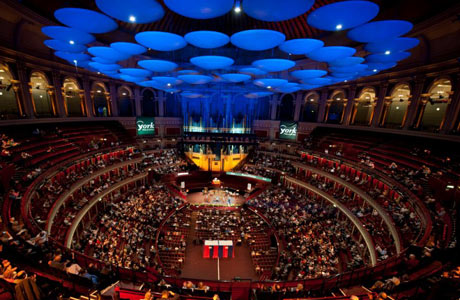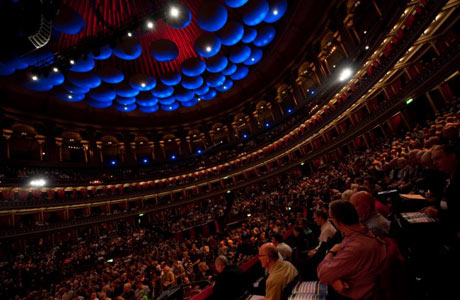2009 National Championships of Great Britain - The no change option
20-Oct-2009After another year at the Albert Hall, Tim Mutum gives his personal views on what he sees as the problems associated with the National Championships.

A future at the Albert Hall?
Picture: Ian Clowes
More National pictures can be found at:
http://www.pbase.com/troonly/09_london_finals
I wouldn’t say I was at the heart of brass banding, living in Suffolk, and my involvement is in any event on the edge rather than in the thick of it, so am I best placed to offer a view on the future of some aspects of the National Brass Band Championships?
Looking in
Well, yes, partly because being on the outer edge looking in, I can see what if you are too close to something you often cannot. And secondly, you would need to be living in outer space to not realise there is a huge problem facing this most prestigious and important event in the brass band calendar.
There are mutterings and views expressed every year of course but in 2009 my perception is that we are at what I believe political commentators call the “tipping point”.
Run its course
That is when something has to happen or change because the current model or policy has run its course, e.g. stealth taxes.
I had rather hoped that, since a decent period has lapsed since the end of this year’s regional contests, “someone” in authority, either the owners or perhaps Alan Hope on behalf of the seven regions plus Scotland, would have said, “Well, we have heard and read the comments after this year’s series and acknowledge that we need to put our thinking caps on. So please watch this space and we will announce some changes.”
There we go – I have said it!
One of the hardest words in life and almost unheard of in brass banding – change. It is, of course, too late for anything to now happen in 2010 but, with the dust having settled on the 2009 National Brass Band Championships, there is a year to consider changes for 2011 and beyond.

Stage managed Nationals?
Picture: Ian Clowes
Doomed
Without change the Nationals in the longer term are doomed. The steady decline will continue. The trouble is some people are kidding themselves. When I first went to the National in 1970, and for years thereafter, getting a ticket was a matter of luck.
You submitted your application and you might get a ticket. A close friend of mine relates the story of how one year he secured a standing ticket and traded up on the day. There was a huge demand that simply could not be met and there were also the two evening concerts.
Forty years later and the website of the owners, Kapitol Promotions, talks of a resurgence of interest and audiences of over 4,000 for the Championship Section final. It’s poppycock!
I understand the official audience figure for last year was less than 2,500. It’s a gross distortion of reality to claim such a high number when the evidence is there in front of you. A look round the hall in 2008 when the top bands were on stage in no way suggested it was 80% full.
If the audience is not there then neither are the bands either.
Figures
In 1998 there were 590 bands competing in the regions. This year the figure was 490. 100 bands have either disappeared or no longer consider it worth the effort to compete. In Scotland and Wales this year there were reports of Fourth Section bands saying they would not be attending next year.
Well, as both regions are down to about six bands competing there is a real problem. And that is not even considering the debate about the unfairness of those two regions sending two representatives to the finals when an area with a list three times the size sends only three. It needs change!

Packing them in: A hall fit for the Nationals?
Picture: Ian Clowes
Regional issues
Whilst talking of the regions let me list a few of the other issues that have been highlighted – too many championship section bands, what is the point of the first section, are the regions geographically appropriate any more and, finally, an easy problem to solve is the number of regions taking place the same weekend.
Except that not even that seems capable of being resolved. I know these halls have to be booked up years in advance, but I don’t think this problem has just started.
To explain, for those unaware, in 2010 there is one region on the weekend of 6/7 March, four the following weekend and three the one after that. The London and Southern Counties region state on their web site that the contest is always held on the third weekend in March and has published the dates for the next 5 years!
So not much room there for collaborative working with other regions and all the other interested parties e.g. adjudicators.
Volunteers
I’ll come on to one of the other big issues shortly, namely music, but before that I want to touch on a controversial area and one of the reasons why I don’t think there is a willingness to consider change, nor is there likely to be any.
The volunteers who organise the regions do a tremendous job. I wouldn’t want to work in a room all day checking registration cards or sit in a draughty foyer selling programmes.
Someone has to and someone has to deal with all the other logistics of getting all these bands through an event, to say nothing of all the pre arrangements leading up to the contests. They do a brilliant job and the band press rightly congratulate them each year.
Heart of the problem
But there is the potential heart of the problem. Some of these people have been doing it for years and they then help at the finals as well. It’s a colossal effort and they can’t give up because, they will tell you, there is nobody else to do it. They are probably right but they may not be.
I will pose a question.
How many of those in the more senior positions such as secretary or treasurer would willingly give it up? It has become part of their life. Don’t tell me you haven’t seen it in your everyday life. The person who has been doing a job voluntarily for years, occasionally moans, complains that nobody else would take it on, but I’d wager a few bob that try and take it away from them and there would be a howl of protest.
Where is this leading? In those scenarios people are in their comfort zone. They know exactly what to do for every moment of the event. I‘ve been there myself. You can almost do it in your sleep.
So, any thought of change is anathema and you can’t challenge them because “I’m a volunteer and if I don’t do it then nobody else will.” Change then becomes an issue.
Leading lights
The leading lights of the seven regions (excluding Scotland) are the secretaries. The significance of these seven people is that they and their colleagues have influence or should have.
Well, three of them do and no apologies for naming names but the North West secretary is Peter Bates, the compere at the Finals, the Northern area secretary is Alan Hope who, yes, is involved with music selection and is the secretary of the apparent regional secretaries’ group that nobody knows anything about, and in Wales it is Philip Morris co-owner of the Nationals through Kapitol Promotions. All rather cosy and, well, I think you’ll get my drift?
What would I change or consider changing? And will it make any difference?
Lingering death
Sadly, in my jaundiced view I now think bands are putting of the inevitable – they are dying a long, lingering death. Brass bands peaked in about 1895 so they have done well to last this long.
All we can hope to do is to apply some medicine that saves the patient for a while longer – and hopefully as long as possible. I am the last person to want to see brass bands die. Anyway here goes.
Well, much of what I think has been said before and I have listed some areas for consideration above. There are three areas though on which I will expand.
Powers that be
Firstly, the powers that be need to start talking to the bands about what they want. I work in local government and, for all its warts, it has long recognised the need to engage with communities on difficult issues. It tries to work with them, listen to their views, keep them informed and explain why something can or cannot happen.
The communities gain a sense of ownership and contribute to the debate. Unless the decision makers are choosing to not communicate to the wider world and just to bands, then I am not aware of a single discussion, decision or consultation that has come from the bi-annual meetings of the regional secretaries and Kapitol Promotions. Perhaps they no longer meet?
Let me provide one example of a useful discussion that could be had with bands and that is prize money.
Since 1980 the Championship Section first prize has been £2,000. From 1987 to date the three prizes have been £2,000, £1,500 and £1,000. I have no idea what they should be now but significantly higher if inflation was included.
The region prizes seem to be around £200, £100 and £75. I would guess that qualification to the final or winning the final far outweighs the monetary aspects. So, there may be a case to scrap the prizes? Not a huge saving but in these difficult times £4,500 is useful.
There is a debate to be had there, which could result in change.
Fourth Section
Secondly, the Fourth Section.
It needs to be opened up to stop it closing down. Do away with the rules, allow bands to enter with as few or many players as they want, let them play a piece best suited to their standards, and scrap the box.
The judges will pick out the good bands for qualification (sooner or later trust has to be introduced so why not start here?) and maybe the bands in that section, and all the other lower sections, would rather go to Butlins in Skegness than an empty hall in Harrogate? Bet nobody has ever asked them though!
The music
Thirdly, the music.
I know, I know. I‘ve heard Alan Hope tell us. The panel members are volunteers, giving of their time freely.
Vision
Well, this is my vision of it.
Four men enter a smoke filled, darkened room and are not allowed to leave until they have pored over dozens of scores and made a selection. They are then released. After last year’s lower section finals one of them, who conducted a band in the second section, admitted the Dean Goffin piece was too difficult. I leave you to draw your own conclusions over that.
Where is the musical policy? For example, year 1 – new music, Year 2 – established original music, Year 3 – classical arrangements. Who picks the Championship Finals piece? What are the criteria? Where is the effort to attract new blood? What efforts have been made to invite scores of a particular theme?
Have the likes of Simon Dobson and Peter Meechan been invited to sit on the panel? Instead of sitting in a darkened room, why not pay the selectors’ expenses to attend the RNCM Festival of Brass?
I could go on – pre draws to stop all the bands having to get to the venue at the same time and then stay and wait for hours on end; judges that turn up year after year at the Royal Albert Hall and at the end insult the intelligence of the audience by saying nothing – whether they speak or not.
Untouched
The current system has gone on largely untouched for all the time I have been involved in banding. I cannot accept that is healthy. But I would give some thought to the status quo continuing if there was a root and branch review and, at the end of it, the conclusion reached was that this is the only way and it’s what the bands want.
At least then I would know that change wasn’t an option but had been given an opportunity to come forth.
However, I cannot believe that the status quo is what is wanted by anybody with an eye on trying to retain the National as the most prestigious banding contest event in the calendar.
Don't want it
Sadly, I don’t think there is a will to even consider change because those with the power and influence simply don’t want it, and the bands can’t be bothered to do anything to force the issue.
That is a great shame as, although contesting is damaging to brass bands outside its own narrow field of interest, it is the piece of sticking plaster that probably holds the movement together and the biggest piece of plaster is undoubtedly the National Brass Band Championships of Great Britain.
Tim Mutum















